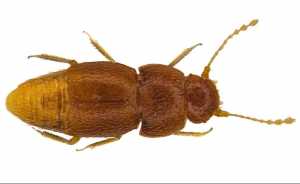Greta Thunberg’s contributions to the fight against climate change is honored with a species named after her.
Nelloptodes gretae is tiny species of beetle that was discovered over 50 years ago. According to London’s Natural History Museum, the newly named arthropod “belongs to a group of some of the smallest known free-living animals.”
Scientists at the Museum now officially refer to the insect as Nelloptodes gretae. This is to give recognition to the teenage climate activist’s “outstanding contribution” in raising awareness of the world’s biggest crisis.

Photo: Michael Darby via Natural History Museum
According to The Guardian, Nelloptodes gretae has neither eyes nor wings and is only 1mm in length. It is a part of the Ptiliidae family, which consists of the planet’s smallest beetle species.
The Natural History Museum’s scientific associate Dr. Michael Darby spoke to the news outlet about the matter. “I chose this name as I am immensely impressed with the work of this young campaigner and wanted to acknowledge her outstanding contribution in raising awareness of environmental issues,” he said.
British naturalist Dr. William C Block discovered the beetle back in 1965 while he was in the capital city of Kenya, Nairobi. Dr. Block’s work was donated to the Natural History Museum back in 1978. Dr. Darby spotted the beetle while working on the museum’s Spirit Collection.
The museum’s senior curator Dr Max Barclay said: “The name of this beetle is particularly poignant since it is likely that undiscovered species are being lost all the time, before scientists have even named them, because of biodiversity loss – so it is appropriate to name one of the newest discoveries after someone who has worked so hard to champion the natural world and protect vulnerable species.”


